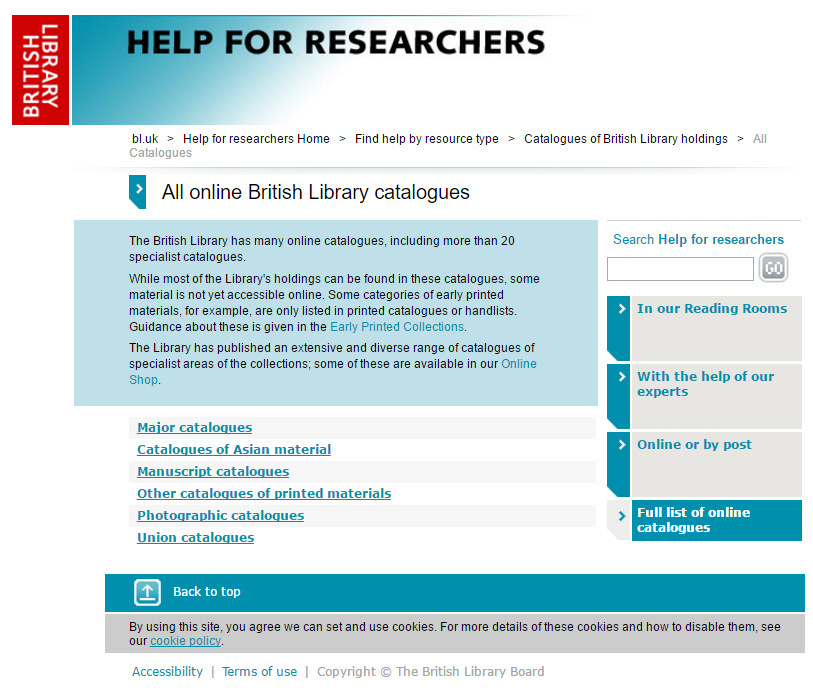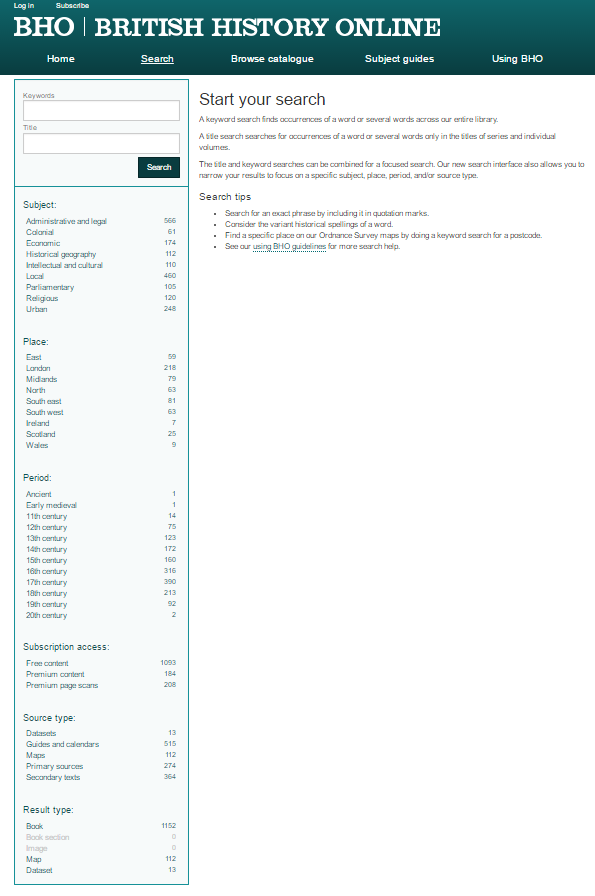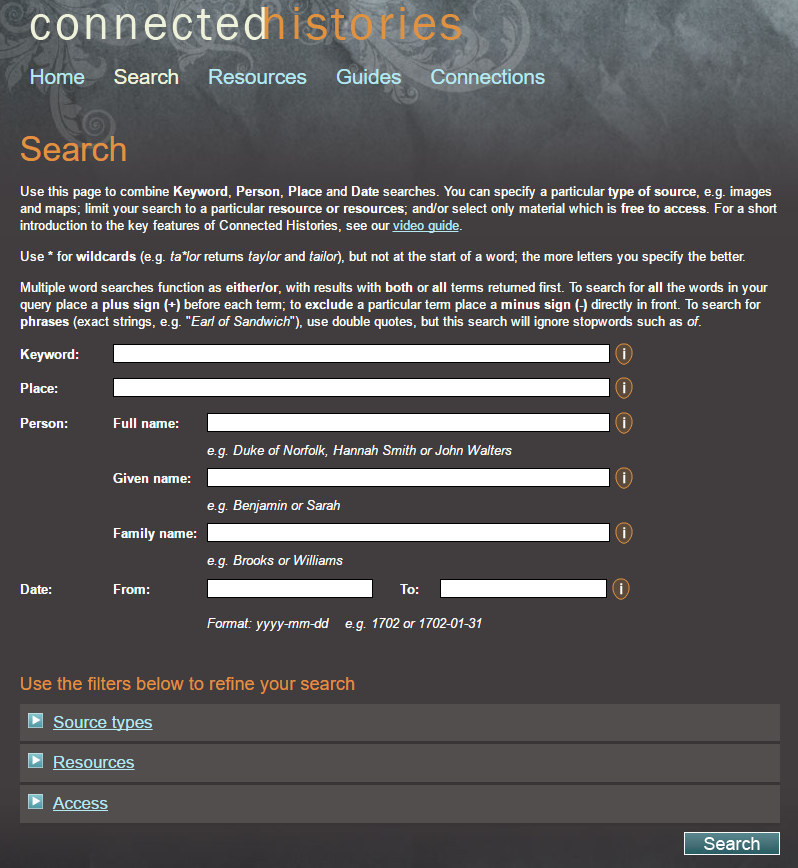Difference between revisions of "Tools: Team Two"
(→Historians use of historical search engines - planned interviews) |
(→Historians use of historical search engines - planned interviews) |
||
| Line 34: | Line 34: | ||
* Friday July 1st 2016 @ 9.30 a.m. (UK time): Thierry Daunois, University of Lorraine | * Friday July 1st 2016 @ 9.30 a.m. (UK time): Thierry Daunois, University of Lorraine | ||
| − | * Friday July 1st 2016 @ | + | * Friday July 1st 2016 @ 10.30 a.m. OR 10.45 a.m. [TBC] : Harriet Richardson, architectural historian, [https://twitter.com/FredaWorley @FredaWorley] |
* Monday July 4th 2016 @ 2 pm: Dr Cathryn Pearce, marine historian, [https://twitter.com/CathrynPearce @CathrynPearce] | * Monday July 4th 2016 @ 2 pm: Dr Cathryn Pearce, marine historian, [https://twitter.com/CathrynPearce @CathrynPearce] | ||
Revision as of 14:46, June 30, 2016
Team two: tailored search of historical documents
Contents
Team summary
We will explore how historians approach historical search when they are looking for people, places and dates. We will look at search engines employed by archives and libraries such as the National Archives and the British Library, at search tools provided by digital resources such as British History online and at federated search tools such as Connected Histories. We will look at search tools, glossaries, and lookup tables on the MarineLives wiki. Our focus will be on how historians really work, and on how technology can be used to speed up and make more effective the day-to-day task of historical search.
An explicit goal of team two will be to understand the semantic properties of the MarineLives semantic media wiki. This wiki was implemented in May 2015 by one of our volunteers, Rowan Beentje. With four million words of full text, over 10,000 manuscript images and over 20,000 pages, improved search will have a dramatic impact for all users of the wiki. A number of potential semantic search plug-ins exist, and we would like our volunteers to specify the functionality our users need and to explore the appropriate semantic search solution.
Historians - we need your input
The MarineLives Digital Pop Up Lab team would like to interview historians about their use of different search engines.
We are seeking to develop a detailed understanding of the types of searches historians perform and wish to perform, and the extent to which current search engines meet their needs.
We would like to explore with historians the specific functionality they would like to see for the MarineLives search engine.
All input will go into our development of a new semantic based search engine for the MarineLives wiki.
The five search engines we are interested in are (1) The National Archives, Kew: Discovery search engine (2) British Library catalogue (3) British History Online (4) Connected Histories and (5) the MarineLives wiki
Please contact us if you would like to do a fifteen minute Skype interview with one of our team
Historians use of historical search engines - planned interviews
By date
- Monday June 27th 2016 @ 11 a.m.: Louise Falcini, PhD candidate, @louisefalcini COMPLETED - SEE INTERVIEW NOTE
- Wednesday, June 29th 2016 @ 11 a.m.: John Levin, PhD candidate, University of Sussex, @anterotesis [COMPLETED]
- Friday July 1st 2016 @ 9.30 a.m. (UK time): Thierry Daunois, University of Lorraine
- Friday July 1st 2016 @ 10.30 a.m. OR 10.45 a.m. [TBC] : Harriet Richardson, architectural historian, @FredaWorley
- Monday July 4th 2016 @ 2 pm: Dr Cathryn Pearce, marine historian, @CathrynPearce
- Tuesday July 5th 2016 @ 2 p.m.: Dr James Brown, Research Associate, Intoxicants Project, University of Sheffield, @intoxproject
- Wednesday, July 6th 2016 @ 10 a.m. : Dr Andy Burn, Postdoctoral Research Assistant on 'Social Relations and Everyday Life in Englad 1500-1640', University of Durham, @aj_burn
Date and time to be decided
- Professor James Daybell, [Day and time TBC] @JamesDaybell
- Dr Jenny Hyde, lecturer, Liverpool Hope University, [REQUEST FOR DAY OF INTERVIEW TO BE CHANGED] @wallyberry
Historical search interview guide
We would like to ask early modern historians of all types (social, economic, political, material, cultural, maritime) the following questions in a fifteen minute Skype interview:
(1) What is your experience of historical research?
- level of study (undergraduate, masters, PhD candidate, post-doctoral, early career scholar, established researcher)?
- types of historical research performed?
(2) What search engines do you use to discover and access historical data?
- Google, archival search engines, library search engines, specialised search engines
- Do you use:
-- English National Archives Discovery search engine?
-- British Library catalogue search engines? [If so, which]
-- British History Online?
-- Connected Histories?
(3) What hardware do you use to access distorical data?
-- personal: laptop, desktop, I-pad, mobile phone?
-- institutional: library terminal?
(4) Choose one historical search engine that you find particularly useful, and talk us through how you use it:
-- Do you structure a search strategy in advance of starting top work with the search engine?
-- Do you write down a search strategy?
-- Do you identify key words or phrases to search for?
(5) Staying with the historical search engine you have chosen in your response to (4), talk us through how you would:
-- research a person?
-- research a place?
(6) How do you capture the results of your searches?
-- do you create a word document or Excel spreadsheet in which to store the searches?
-- do you keep a record of the search terms which generated your results?
-- do you store the search results and extracts of the records they refer to in the same word document or Excel spreadsheet?
(7) How do you sequence your searches and your use of search engines?
-- do you work methodically through predefined search terms in one search engine and then move on to the next one?
-- do you have multiple search engines open at the same time and move backwards and forwards between them in response to specific research results?
(8) Have you performed searches on the MarineLives wiki?
-- If so, please tell us about your experience of searching the MarineLives wiki?
-- What tools have you used to find data on the wiki (vertical sidebar; lists of deponents; thematic pages; search box in top right hand corner of each wiki page)?
-- What improvements would you like to see to MarineLives wiki searchability and discoverability?
Interview notes on historical search strategies and use of search engines
Louise Falcini, PhD candidate, University of Reading
Skype interview: Monday June 27th 2016 @ 11 a.m.
Interviewee: Louise Falcini @louisefalcini Academia.edu profile
Interviewer: Colin Greenstreet @Marinelivesorg Academia.edu profile
Q1
Louise Falcini is a highly experienced archivist, who used to work at the London Metropolitan Archives. She is now at the write-up stage of her PhD dissertation, which she has embarked on as a mature student. Her dissertation concerns the London poor in the long C18th. Her PhD dissertation supervisor is Professor Tim Hitchcock.
Q2
Louise approaches historical search with a very clear sense of what she is looking for, and has a good sense of the location and nature of the archives, which are likely to yield fruitful information.
Her use of search engines for research is focussed, with very limited use of serendipitous or wild card approaches.
Asked to name the four or five main search engines she uses, Louise named without prompting (in the order of their naming): (1) The National Archives Discovery Search Engine - simple not "advanced" screen (2) London Metropolitan Archives online catalogue (3) A2A [Archives 2 Archives], now part of the National Archives Discovery search engine (4) London Lives. On prompting, Louise named four additional search engines (1) Connected Histories (2) British History Online (3) Old Bailey Online, which she gets access through London Lives (4) British Library.
Louise makes considerable use of TNA Discovery Engine, LMA online catalogue, and London Lives. She rarely uses the British Library Online Catalogues.
Q3
Louise works primarily at home from her desktop computer. She has two screens, one larger than the other. She does not use libary or archival terminals for search, though she will use them to order up material.
Q4
Louise identifies sets of potential search terms to support a specific research strategy and will then implement them in the appropriate search engine or online catalogue.
She makes use of "Sounds like" features, where they are available. An example of this is for London Lives. See London Lives information on search engine functionality
Louise makes considerable use of Google Books when searching for secondary sources. She also uses Early English Books Online and Echo.
Locating London's Past is useful for its detailed maps John Roque 1746 map of London. It also has useful functionality allowing the mapping of key words
Q5
This question was not discussed.
Q6
Louise captures the results of her searches in the SW package Zotero.
Some search engines allow autosave of data into Zotero, for example Old Bailey Online. See Organising Your Research With Reference Management Tools (e.g. Zotero)
She regularly shares her Zotero files with her PhD supervisor, who will comment on new potential sources and use of existing sources, but does not directly annotate the Zotero files.
Q7
This question was not discussed.
Q8
Louise has not performed research oriented searches on the MarineLives wiki, since the mid-C17th falls outside the period of interest for her PhD dissertation. She was therefore unable to comment on search functionality and user experience of the MarineLives wiki.
Semantic search on MarineLives Semantic Media Wiki
The MarineLives wiki is a Semantic Media Wiki. For technological background see [Tools: Tech Talk|Rowan Beentje, 'Tech Talk', June 27th 2016]
The semantic features of the wiki offer the ability to specify semantic searches.
Display all pages transcribed in a calendar year
Search screens
Useful links
National Archives advanced search
British Library catalogue search
British History online search
Connected Histories search
Semantic MediaWiki
Semantic mediawiki capabilities
Semantic extension: Google Maps format
Semantic extension: OpenLayers format
Semantic extension: KML format



